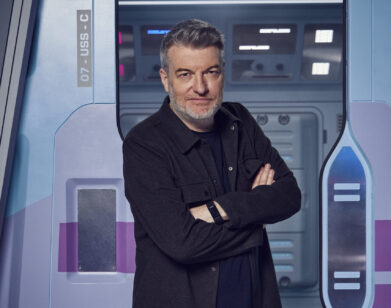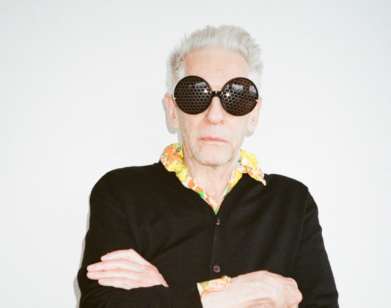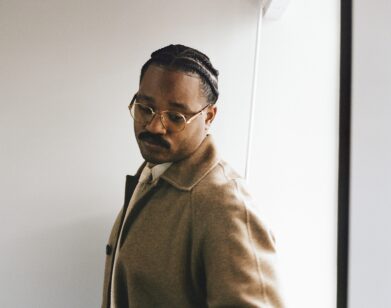New Again: Christian Bale
To describe this weekend’s imminent Batman release as a “blockbuster” would be a crass understatement—Christian Bale’s character arc as billionaire-cum-superhero Bruce Wayne has been one of the most engrossing (and highest-grossing) big-screen storylines of the last decade. His tenure as Batman ends with The Dark Knight Rises (out Friday), the final installment in Christopher Nolan’s impossibly popular trilogy. Bale’s last masked performance boasts an exhaustively impressive cast that relegates talents like Morgan Freeman and Marion Cotillard to the sidelines.
Bale’s ascent as an actor has been true to heroic form. He started young, quietly impressing critics in a string of period dramas, from WWII-era China in Spielberg‘s Empire of the Sun (1987) to the 1970s glam-rock circuit of Todd Haynes’s Velvet Goldmine (1998). It was not until he starred in American Psycho, whose debut at the 2000 Sundance Film Festival was marked more by polemics than praise, that Bale began to interest industry authorities like Roger Ebert.
In 2001, a few years before beginning his stint as Nolan’s Batman, Bale sat down to talk with Interview‘s erstwhile Film Writer at Large, Graham Fuller. At the time, Fuller described Bale as a “well-kept secret,” alluding to some unforeseeable but “inevitable mainstream breakthrough.” Pretty clairvoyant: two years later, Bale was cast in the trilogy whose finale will be topping box office sales this very weekend. In their conversation, which we have reprinted below, Bale discusses the importance of fearlessness and foolishness, the joy of having feminist icon Gloria Steinem for a stepmother, and his indifference to Internet groupies (which we can only imagine has served him well, as both he and the Internet became fairly popular in the years since). – Zack Etheart
Christian Bale: The Actor Is on a Fantastic Voyage
By Graham Fuller
Christian Bale, the 27-year-old movie actor, cannot be said to have taken an inordinate number of risks early on in his career, unless one counts his decision to let Kenneth Branagh carry him across the muddy, body-strewn Agincourt battlefield in Henry V (1989), which Bale appeared in when he was 15. It was not that the handsome young English actor was timid; it was that his roles didn’t require him to act strange or mad.
Then he was cast as Patrick Bateman, the sleek, smug, homicidal maniac in Mary Harron’s film of Bret Easton Ellis’ American Psycho. He seemed to have lost the role because Leonardo DiCaprio evinced interest in it, but Bale got it back again when Leo, well, bailed. And Bale justified Harron’s faith in him. Tanned a jaundiced pallor, veins bulging in his forehead, oozing yuppie superciliousness, he acted out of his skin. The gamble paid off because Bale made Bateman a cartoon, though it could so easily have damaged his career. If only one could be a fly on the wall should Bale one day discuss the routinely misogynistic Bateman with his new stepmom, feminist leader Gloria Steinem.
Since American Psycho, Bale has married and worked steadily, coming ever closer to his inevitable mainstream breakthrough. I talked to him the day after he completed filming for his part opposite Emily Watson in the upcoming sci-fi actioner Equilibrium.
GRAHAM FULLER: Hi Christian. How are you?
CHRISTIAN BALE: I’m all right, thank you. I’m leaving Berlin tomorrow after three months.
FULLER: It’s been—what?—two years since we sat down and talked about Velvet Goldmine.
BALE: In the lobby of the Royalton hotel in New York.
FULLER: So catch me up a little bit. After Goldmine you did American Psycho, Shaft, and then Captain Corelli’s Mandolin, which we’ll see this spring. What do you play in that?
BALE: I play a Greek fisherman called Mandras, which I’ve been told means “privet hedge” in Greek, although nobody quite understands why he’s called that.
FULLER: What happens to him?
BALE: His life is ruined, basically, because his love for a local girl [played by Penélope Cruz] coincides with World War II. He leaves behind the idyllic life he has in his small fishing village to show he’ll risk his life for the people and village he loves, but then he returns from the war to find that the village no longer exists and the girl has fallen in love with one of the men [Nicolas Cage] he’d been fighting against.
FULLER: Was playing a Greek fisherman a stretch for you?
BALE: It became comfortable, but initially yes, it was a stretch. But after having done American Psycho and Shaft, I found it a breath of fresh air to play somebody who’s completely human in terms of his emotions.
FULLER: Taking on roles that you don’t know you can play is integral to an actor’s life.
BALE: It’s the actors who are prepared to make fools of themselves who are usually the ones who come to mean something to the audience.
FULLER: When you did Empire of the Sun (1987) at age 13, were you scared of the responsibility?
BALE: Only afterwards did that occur to me. I’d nothing to lose, I wasn’t thinking in terms of a career. I wasn’t really thinking about the consequences at all.
FULLER: So you wouldn’t say you were necessarily fearless when you acted in that movie?
BALE: I tend to think you’re fearless when you recognize why you should be scared of things, but do them anyway. I didn’t recognize it that time.
FULLER: So there was no need for you to screw up your courage? You just went in and did it?
BALE: Yes. It was completely unself-conscious. I think it was a great benefit that I wasn’t very knowledgeable about movies at all, because I never looked at the big picture. It was about what I was doing right there and then. And I think I had the natural enjoyment you have at that age if you take your imagination to extremes, but actually in this case having adults around approving of what I did.
FULLER: That’s interesting because adolescence is when self-consciousness usually kicks in.
BALE: That happened to me right after the movie.
FULLER: And did that affect your thoughts about acting professionally?
BALE: Yes. Suddenly people were saying I was cocky because I’d done a Steven Spielberg movie and thought I was better than everyone else, which surprised me at first. I suddenly started feeling like a freak because everyone was treating me differently. It was confusing, and I did wonder if acting was for me anymore.
FULLER: When did that feeling pass?
BALE: I went backwards and forwards over it until I was 22. And then in the past few years I began to say to myself, OK, look, I’m not messing around. This is something I want to attack, instead of thinking, I’ll just see what happens with it.
FULLER: How do you go about attacking it?
BALE: It’s about pursuing it rather than waiting to see what comes along. That’s partly because I found myself getting typecast, as everyone does unless they pursue roles that are very different from what they’ve done before.
FULLER: As an actor, do you get used to living with risk: one, because you never know where the next job is coming from, and, two, because you have to deliver on an emotional level every moment you’re on camera?
BALE: Yes. I grew up, though, with constant change in my life because we moved around a lot. And I not only inherited an aversion to the nine-to-five routine, but the sense from my parents that being bored and boring is the worst thing that you can be. Obviously there are times with acting when exactly what is required is just going through the motions, and when doing nothing is the best thing. But at other times, you have to make that leap beyond the immediate environment of people putting up lights on the set. If you’re doing your job properly, you take the risk of feeling slightly foolish and delve in and bring out the emotions. And it’s down to minutes at a time because here you are, you’re right on the set, and no matter what’s happened to you that day, no matter what kind of mood you’re in, you’re going to manage to do it within these few takes that you have. In those moments, you rise to the occasion or not. You either decide to take the easy way out, which means you’re only going to disappoint yourself and everybody else, or you take the risk right now of being a fool, which is the only way you’ll end up being exhilarated later on when you actually watch the movie.
FULLER: There’s a scene in American Psycho when you’re on the bed having sex with two prostitutes and you’re flexing your arms in front of a video camera. Do you remember thinking, I’m going to look absurd?
BALE: No. I never viewed Patrick Bateman as a real character. It wasn’t going to work unless I made myself look absurd. There were so many times in that movie where I had to take that leap, and by the time I did that scene it really didn’t feel like much of a leap at all. It felt very much like just another day on the set of American Psycho.
FULLER: How does that movie figure now in your list of “risk-taking things I’ve done”—not so much because of the acting but because of the controversial subject?
BALE: The risk element only came from acknowledging other people’s attitudes toward it, and realizing that they considered it to be a risk for me to do. I think people are often far less tolerant when they’re in crowds and feel the need for whatever reason to say, “My God, I object to this,” and, in the case of American Psycho, not seeing it for the intelligent satire that it is. It’s hard to believe that people watching it by themselves, without feeling they have to announce their morality to anybody, would be shocked by it.
FULLER: Have you ever been scared you couldn’t do a character you’d signed on to do?
BALE: No, only disappointment in myself on those occasions I didn’t manage to rise to the occasion as I felt I should’ve done. I can always see how to do it, and then the challenge is, Can I manage that each and every day?
FULLER: Do you think of yourself as more interesting in private than in public?
BALE: Yes, I become a bit of a blank page in public. And that’s precisely why I like acting.
FULLER: You got married about a year ago, right? Was falling in love an adventure, as it usually is?
BALE: Yes, completely. And completely unexpected. I think that was the joy of it. It came out of nowhere.
FULLER: And you were ready for it?
BALE: I absolutely didn’t feel ready for it at all. I didn’t think anything like that would happen to me for years. When I imagined my life, I always thought I’d be in my mid-30s before I felt capable of that. But I suddenly found that I’d met somebody and I said, “Screw it. I’m not gonna sit here saying, ‘Oh no, I’m not ready,’ and regret not having done this later on and the possibility of not having this person around.” I thought, I’ll jump into it and we’ll figure it out as we go along.
FULLER: And your dad got married again shortly afterwards. Tell me a little bit about your new stepmother.
BALE: [laughs] I actually haven’t seen Gloria or my dad since they got married because I’ve been away since May. Talking of unexpected things, I don’t think my father thought that anything like this would happen to him at this point in his life. My wife [Sibi] and I will be spending a few weeks with the two of them soon, and it’ll be fantastic because I’ve been accustomed to my father always being alone. He only met his father like six times in his life. I met my grandfather just before he died, and it was the first time that I had seen Dad with a relative of his. It was interesting to see my own father as a son and the body language and alteration in attitude that comes with that, and it sort of changed our relationship for the better. Now I’m looking forward to seeing him with a partner.
FULLER: When you got married yourself, you did, of course, ruin the lives of thousands of Bale-heads out there, and I’m curious how much guilt you feel about that.
BALE: Well, absolutely none, obviously.
FULLER: Do you understand the Bale-head phenomenon—your immense following on the Internet?
BALE: I appreciate it, but I try to keep a distance. I’ve always felt that I would rather see an actor, writer, or musician’s work, rather than actually know the person. If you know too much about an artist, it somehow lessens their ability to do their work as well.
FULLER: In your case, the fan worship has been an unusual phenomenon because. . .
BALE: ‘Cause nobody else knows me.
FULLER: Well, you’re more of a well-kept secret.
BALE: I’d love to remain a secret and still work, but I also want people to see the movies I’m in and get a higher profile because of that. I like to think that as long as you continue choosing diverse roles, you can avoid becoming predictable.
FULLER: Are you happy?
BALE: I am today. I’ve been on movie sets since the beginning of May and I’ve forgotten what it’s like not to have a call sheet every evening. Now my wife and I are just gonna rent a car and drive around Europe. We’re not planning anything, just heading off on an adventure.
THIS INTERVIEW ORIGINALLY APPEARED IN THE FEBRUARY 2001 ISSUE OF INTERVIEW.
For more New Again, click here.







